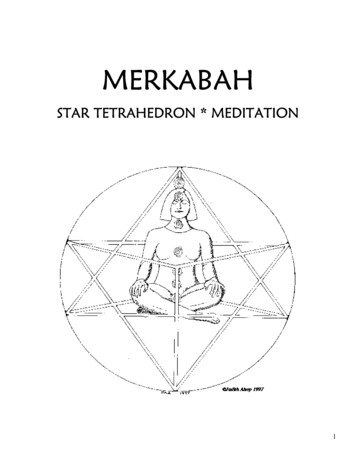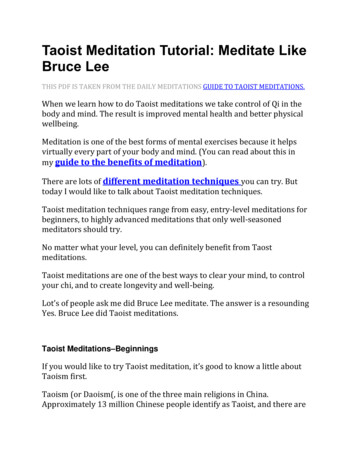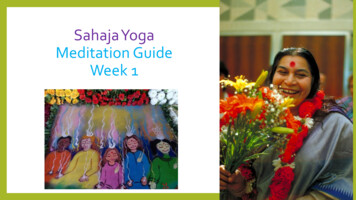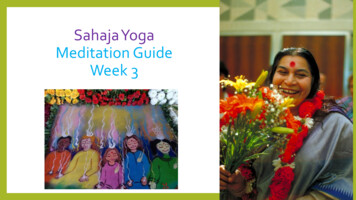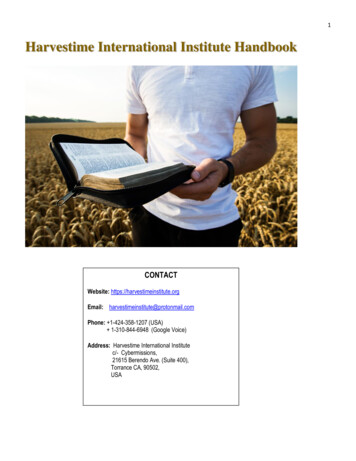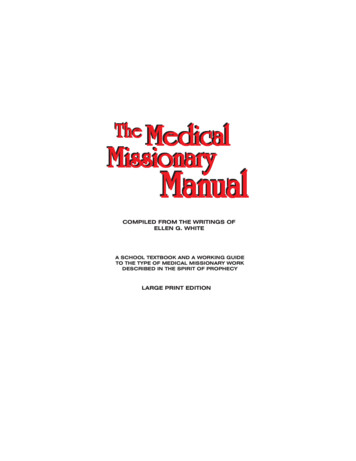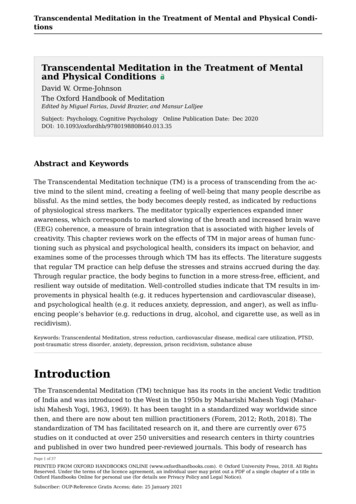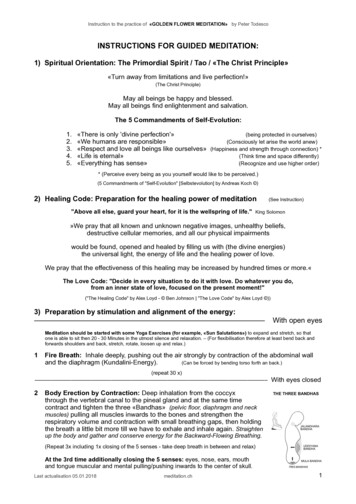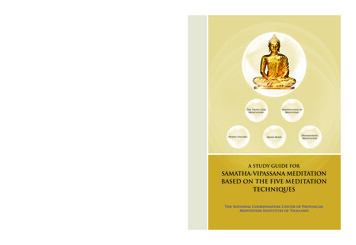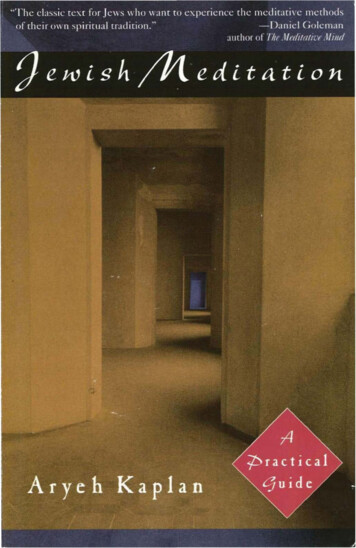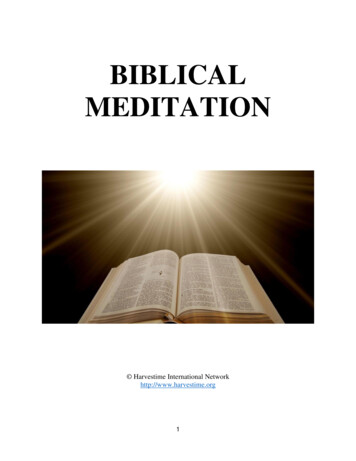
Transcription
BIBLICALMEDITATION Harvestime International Networkhttp://www.harvestime.org1
TABLE OF CONTENTSIntroduction To Biblical Meditation3Objectives4Chapter 1:Exposing Meditation Diversions5Chapter 2:Defining Biblical Meditation13Chapter 3:Recognizing The Importance Of Meditation19Chapter 4:Making Time To Meditate29Chapter 5:Preparing For Meditation35Chapter 6:Eliminating Hindrances To Meditation39Chapter 7:Employing Methods Of Meditation: Part One44Chapter 8:Employing Methods Of Meditation: Part Two51Chapter 9:Selecting Topics For Meditation: Part One67Chapter 10:Selecting Topics For Meditation: Part Two76Chapter 11:Selecting Topics For Meditation: Part Three85Epilogue:Passing It On94Answers To TestsAppendix One95Scriptural Index1032
INTRODUCTIONTO BIBLICAL MEDITATIONWe live in a microwave generation. People are impatient. Everyone wants everything rightnow. We have high speed cameras, high speed internet, fast food, fast track traffic lanes, and wecan watch current events instantaneously as they occur by satellite television broadcasting.The question is, what are we forfeiting spiritually by our haste and impatience? For Esau, it washis birthright (Genesis 25:29-34). For King Saul, it was his kingdom (1 Samuel 13). Manybelievers who are caught up in the flurry of this “microwave” generation are forfeiting greatspiritual benefits. One of these is the blessing of Biblical meditation.A.W. Tozer notes:“A generation of Christians reared among push buttons and automatic machines isimpatient of slower and less direct methods of reaching their goals. We have been tryingto apply machine-age methods to our relations with God. We read our chapter, have ourshort devotions, and rush away, hoping to make up for our deep inward bankruptcy byattending another gospel meeting or listening to another thrilling story told by a religiousadventurer lately returned from afar.The tragic results of this spirit are all about us: Shallow lives, hollow religiousphilosophies, the preponderance of the element of fun in gospel meetings, theglorification of men, trust in religious externalities, quasi-religious fellowships,salesmanship methods, the mistaking of dynamic personality for the power of the Spirit We don’t need to have our doctrine straightened out; we’re as orthodox as the Phariseesof old. But this longing for God that brings spiritual torrents and whirlwinds ofseeking this is almost gone from our midst.”This study presents Biblical meditation as a spiritual discipline that is essential for Christians. Itexposes the dangers of meditation diversions and defines Biblical meditation, its purposes, andits importance. The study includes practical suggestions for making time to meditate, preparingfor meditation, and eliminating hindrances. Guidelines are given on meditation methods andselecting Scriptural topics for meditation. Each chapter includes study questions and practicalsteps for personal application.The purpose of this study is not to generate an intellectual discussion of meditation. Its objectiveis to lead you into a discipline that will totally revolutionize your spiritual life—the practice ofBiblical meditation.3
OBJECTIVESUpon conclusion of this study you will be able to:-Identify unscriptural methods of meditation.-Summarize the dangers of unscriptural methods of meditation.-Define Biblical meditation.-List purposes for Biblical meditation.-Give Biblical examples of people who meditated.-Explain the importance of meditation.-Summarize suggestions for making meditation part of your daily routine.-Explain the difference between occasional and deliberate meditation.-Identify times when meditation would be especially important.-Explain the importance of having a regular time for meditation.-Summarize guidelines for selecting a season for meditation-Explain the importance of seclusion during meditation.-Summarize ideas for establishing surroundings conducive to meditation.-Summarize guidelines for maintaining silence during meditation.-List basic supplies needed for meditation.-Discuss hindrances to meditation and strategies to overcome them.-Summarize methods of meditation.-Identify topics for meditation.Personal objectives:-Abandon unscriptural meditation methods.-Prepare for personal meditation.-Eliminate hindrances to meditation.-Select relevant topics for meditation.-Complete practice meditations on a verse, a passage, and a topic.-Make meditation a regular part of your time with God.-Share what you have learned with others.4
CHAPTER ONEEXPOSING MEDITATION DIVERSIONSOBJECTIVES:Upon completion of this chapter you will be able to:-Define and summarize the Scriptural position on mantra meditation.-Define and summarize the Scriptural position on transcendental meditation.-Define and summarize the Scriptural position on mindfulness meditation.-Define and summarize the Scriptural position on spiritual meditation.-Define and summarize the Scriptural position on New Age meditation.-Define and summarize the Scriptural position on focused meditation.-Define and summarize the Scriptural position on movement meditation.-Explain the spiritual dangers of these diverse forms of meditation.INTRODUCTIONSadly, when one speaks of meditation today, they are often referring to non-scriptural methods.Before we explore the subject of Biblical meditation, we need to dispel the deceptive forms ofmeditation advocated by our culture today. The concept of meditation has been corrupted bybelief systems that do not acknowledge the Trinity of God or the precepts of the Bible. Thesedeceptive forms of meditation are seducing spirits about which the Bible warns:Now the Spirit speaketh expressly, that in the latter times some shall depart from thefaith, giving heed to seducing spirits, and doctrines of devils. (1 Timothy 4:1)Christians must avoid all forms of meditation that divert them from that originally designed andcommanded by God which we are calling “Biblical meditation” in this study.METHODS TO AVOIDChristians should not engage in the following types of meditation:-Mantra meditation, prominent in Hindu and Buddhist religions, uses repetitive words, phrases,or sounds that claim to promote ultimate relaxation and alleviate stress. The Bible warns againstvain repetitions (Matthew 6:7). Biblical meditation is not a practice of speaking, but rather ofhearing from God.5
-Transcendental meditation encourages one to empty their mind.David. W. Saxton notes:“Sadly, in recent years many associate meditation with false religion of the Far East.They view meditation as a process of emptying the mind rather than, as Scripturecommands, filling the mind with divinely revealed truth.”Transcendental meditation also uses mantras, but the mantra is original and unique to eachpractitioner rather than a common one. Again, this is vain repetition against which the Biblewarns (Matthew 6:7).-Mindfulness meditation originates from Buddhist teachings. The focus is on your ownthoughts as they pass through your mind, but the Bible teaches that your thoughts are not God’sthoughts:For my thoughts are not your thoughts, neither are your ways my ways, saith the Lord.For as the heavens are higher than the earth, so are my ways higher than your ways, andmy thoughts than your thoughts. (Isaiah 55:8)Your thoughts come from your heart and the Bible reveals that “The heart is deceitful above allthings, and desperately wicked: who can know it?” (Jeremiah 17:9). When each person doeswhat he thinks in his own heart, this leads to an environment like that in the time of the judgeswhere everyone did what was right in his own eyes (Judges 21:25).In Biblical meditation the believer fills his mind with thoughts about God, His Word, and Hisworks.-Spiritual meditation is a term used in Eastern religions, such as Hinduism and Daoism. Thefocus is on silence and seeking a connection with any god or the universe in general. The Bibledeclares there is only one God and we are to worship Him:And God spake all these words, saying, I am the Lord thy God, which have brought theeout of the land of Egypt, out of the house of bondage. Thou shalt have no other godsbefore me. Thou shalt not make unto thee any graven image, or any likeness of any thingthat is in heaven above, or that is in the earth beneath, or that is in the water under theearth (Exodus 20:1-4)-New Age meditation seeks to change a person's perceptions of self and the world in order tosupport the New Age philosophy and goals. The object is self, whereas in Biblical meditation theobject is God. New Age meditation promotes altered states of consciousness, development ofpsychic powers, and spirit possession. These are all practices of the occult against which theBible warns:6
There shall not be found among you any one that maketh his son or his daughter to passthrough the fire, or that useth divination, or an observer of times, or an enchanter, or awitch, Or a charmer, or a consulter with familiar spirits, or a wizard, or a necromancer.For all that do these things are an abomination unto the Lord: and because of theseabominations the Lord thy God doth drive them out from before thee.(Deuteronomy 18:10-12)-Focused meditation involves concentration using any of the five senses. Examples includefocusing on your breathing patterns, counting beads, staring at a candle flame, etc. The focus ofBiblical meditation is the Trinity of God, His works, and His Word.-Movement meditation is an active form of meditation involving bodily movement. Yoga isperhaps the best known form of this meditation. Many Christians who do not understand thehistory behind yoga think it is simply a means of physical exercise, strengthening and improvingflexibility of the muscles, and relaxing. Yoga, however, is an ancient practice which is derivedfrom India and is believed to be the path to spiritual growth and enlightenment. Many believersengage in it without understanding of the subtle underlying meanings.The word yoga means "union" or “yoking”. The goal is to unite one's self with the infiniteBrahman, the Hindu concept of "god" which is an impersonal spiritual substance that is one withnature and the cosmos. This is also called "pantheism," the belief that everything is God and thatreality consists only of the universe and nature. The yoga philosophy makes no distinctionbetween man and God.The various positions in yoga have spiritual meanings related to Hindu gods. Hinduism teachesthat this world is nothing more than an illusion. In Hindu and Buddhist writings, yoga isdescribed as a way of escaping the endless cycle of reincarnation and the laws of karma. Thephysical exercises and positions, along with the breathing techniques, were originally developedfor spiritual and religious reasons. Examples are the poses of the cobra, greeting the sun, and themountain all of which are positions designed to welcome Hindu gods.SPIRITUAL DANGERSThese forms of meditation are dangerous spiritually because:-They appeal to the same desire that prompted the first sin of mankind—man being in control,“You shall be as gods”:Now the serpent was more subtil than any beast of the field which the Lord God hadmade. And he said unto the woman, Yea, hath God said, Ye shall not eat of every tree ofthe garden? And the woman said unto the serpent, We may eat of the fruit of the trees ofthe garden: But of the fruit of the tree which is in the midst of the garden, God hath said,Ye shall not eat of it, neither shall ye touch it, lest ye die. And the serpent said unto thewoman, Ye shall not surely die: For God doth know that in the day ye eat thereof, thenyour eyes shall be opened, and ye shall be as gods, knowing good and evil. And when thewoman saw that the tree was good for food, and that it was pleasant to the eyes, and a7
tree to be desired to make one wise, she took of the fruit thereof, and did eat, and gavealso unto her husband with her; and he did eat. (Genesis 3:1-6)-They advocate focusing on self instead of focusing on the Trinity of God, His works, and HisWord. They emphasize centering yourself, concentrating on your inner self and bodily functionslike breathing, emotions, etc. Biblical meditation is God-centered rather than self-centered. TheBible reveals that there is no good thing in mankind:For I know that in me (that is, in my flesh,) dwelleth no good thing: for to will is presentwith me; but how to perform that which is good I find not. For the good that I would I donot: but the evil which I would not, that I do. (Romans 7:18-19)-These methods advocate emptying the mind, which is dangerous because it gives Satanic forcesan opportunity to enter:When the unclean spirit is gone out of a man, he walketh through dry places, seekingrest; and finding none, he saith, I will return unto my house whence I came out. Andwhen he cometh, he findeth it swept and garnished. Then goeth he, and taketh to himseven other spirits more wicked than himself; and they enter in, and dwell there: and thelast state of that man is worse than the first. (Luke 11:24-26)In Biblical meditation, one is to be filled with:-The Holy Spirit: “And be not drunk with wine, wherein is excess; but be filled with theSpirit ” (Ephesians 5:18).-The fulness of God: “And to know the love of Christ, which passeth knowledge, that yemight be filled with all the fulness of God” (Ephesians 3:19).-The fruits of righteousness: “Being filled with the fruits of righteousness, which are byJesus Christ, unto the glory and praise of God” (Philippians 1:11).-Joy: “Now the God of hope fill you with all joy and peace in believing, that ye mayabound in hope, through the power of the Holy Ghost” (Romans 15:13).-The knowledge of God’s will: “For this cause we also, since the day we heard it, do notcease to pray for you, and to desire that ye might be filled with the knowledge of his willin all wisdom and spiritual understanding” (Colossians 1:9).-All goodness and knowledge: “And I myself also am persuaded of you, my brethren,that ye also are full of goodness, filled with all knowledge, able also to admonish oneanother” (Romans 15:14).-Deceptive meditation methods result in risks to physical, mental, emotional, and spiritual health.There have been documented cases of people loosing bodily awareness, having terrible visions,and experiencing uncontrollable emotions and terror while using some of these methods.8
-Some of these methods are an attempt to combine Christianity with other religiously-basedrituals, a practice which is forbidden by God:When the Lord your God cuts off from before you the nations which you go to dispossess,and you displace them and dwell in their land, take heed to yourself that you are notensnared to follow them, after they are destroyed from before you, and that you do notinquire after their gods, saying, 'How did these nations serve their gods? I also will dolikewise.' You shall not worship the Lord your God in that way; for every abomination tothe Lord which He hates they have done to their gods; for they burn even their sons anddaughters in the fire to their gods. Whatever I command you, be careful to observe it; youshall not add to it nor take away from it. (Deuteronomy 12:29-32, NKJV)An example of this is combining Christianity with Yoga calling it “Christian Yoga”. The twowords “Christianity” and “Yoga” do not belong in the same sentence. This is an attempt tocombine a heathen practice with Christianity.-Unbiblical meditation methods encourage you to focus on your thoughts. Look at the results ofthis in the examples of the fool, the Pharisee, and the farmer:The fool hath said in his heart, There is no God (Psalm 14:1)The Pharisee stood and prayed thus with himself, God, I thank thee, that I am not asother men are, extortioners, unjust, adulterers, or even as this publican. I fast twice in theweek, I give tithes of all that I possess. And the publican, standing afar off, would not liftup so much as his eyes unto heaven, but smote upon his breast, saying, God be mercifulto me a sinner. I tell you, this man went down to his house justified rather than the other:for every one that exalteth himself shall be abased; and he that humbleth himself shall beexalted. (Luke 18:11-14)And he spake a parable unto them, saying, The ground of a certain rich man broughtforth plentifully: And he thought within himself, saying, What shall I do, because I haveno room where to bestow my fruits? And he said, This will I do: I will pull down mybarns, and build greater; and there will I bestow all my fruits and my goods. And I willsay to my soul, Soul, thou hast much goods laid up for many years; take thine ease, eat,drink, and be merry. But God said unto him, Thou fool, this night thy soul shall berequired of thee: then whose shall those things be, which thou hast provided? So is hethat layeth up treasure for himself, and is not rich toward God. (Luke 12:16-21)Note the different results when thoughts are centered on God:When I worried about many things, your assuring words soothed my soul.(Psalm 94:19, GWT)Trust in the Lord, and do good; so shalt thou dwell in the land, and verily thou shalt befed. Delight thyself also in the Lord; and he shall give thee the desires of thine heart.9
Commit thy way unto the Lord; trust also in him; and he shall bring it to pass. And heshall bring forth thy righteousness as the light, and thy judgment as the noonday.(Psalm 37:3-6)Trust in the Lord with all thine heart; and lean not unto thine own understanding. In allthy ways acknowledge him, and he shall direct thy paths. Be not wise in thine own eyes:fear the Lord, and depart from evil. It shall be health to thy navel, and marrow to thybones. (Proverbs 3:5-8)Commit thy works unto the Lord, and thy thoughts shall be established. (Proverbs 16:3)A NEW BEGINNNINGIf you have been engaging in any of these deceptive methods of meditation, stop! Pray and askGod to forgive you:If we say that we have no sin, we deceive ourselves, and the truth is not in us. If weconfess our sins, he is faithful and just to forgive us our sins, and to cleanse us from allunrighteousness. If we say that we have not sinned, we make him a liar, and his word isnot in us. (1 John 1:8-10)Now you are ready for a new beginning as you learn how to meditate the way God intended.You are prepared for an exciting new spiritual adventure as you explore the subject of Biblicalmeditation.10
CHAPTER ONE TESTUsing the subheading “Methods To Avoid”, answer the following questions.1.Define mantra meditation. Summarize the Scriptural position on this form of meditation.2.Define transcendental meditation. Summarize the Scriptural position on this form ofmeditation.3.Define mindfulness meditation. Summarize the Scriptural position on this form ofmeditation.4.Define spiritual meditation. Summarize the Scriptural position on this form of meditation.5.Define New Age meditation. Summarize the Scriptural position on this form ofmeditation.6.Define focused meditation. Summarize the Scriptural position on this form of meditation.7.Define movement meditation.8.What is the most common type of movement meditation and why is it wrong for abeliever to engage in it?Using the subheading “Spiritual Dangers”, complete the following:9.To what does this type of meditation appeal?10.On what do these types of meditation focus?11.What do these methods advocate regarding your mind during meditation?12.Why is it dangerous to empty the mind?13.Using the following Scriptures, summarize what a Believer’s mind should be filled with.-Ephesians 5:18-Ephesians 3:19-Philippians 1:11-Romans 15:13-Colossians 1:9-Romans 15:1414.What are some of the risks of these types of meditation?11
15.Using Deuteronomy 12:29-32, explain why these types of meditation are wrong for abeliever.16.Summarize the wrong thoughts of the fool (Psalm 14:1); the Pharisee (Luke 18:11-14);and the farmer (Luke 12:16-21).17.Use the following Scriptures to summarize the results of having your mind filled withthoughts about God and His Word.-Psalm 94:19-Psalm 37:3-6-Proverbs 3:5-8-Proverbs 16:312
CHAPTER TWODEFINING BIBLICAL MEDITATIONOBJECTIVES:Upon completion of this chapter you will be able to:-Define Biblical meditation.-Explain what Biblical meditation involves.-Summarize selected quotes on meditation.-List three main purposes of meditation.INTRODUCTIONSelwyn Huges notes:“For some reason, Bible meditation has become a lost art in our day. A survey conductedamong Christians in the United States showed that only one in ten thousand knew how tomeditate on the Scriptures. What, then, is the art of Scripture meditation? Is it readingparts of the Bible as slowly as possible so that every word sinks in? No. Is it studying apassage with the aid of a commentary so that one understands exactly what the Scriptureis saying? No. Is it memorizing certain texts and recalling them to mind whenever onehas a spare moment? No. You can do all of these things and still not know how tomeditate.”BIBLICAL MEDITATIONSo what is Biblical meditation? One Hebrew word for “meditate” is “hagah” which means tospeak, utter, study, rehearse, and muse over something internally. A second Hebrew term is“siyach” which is translated “meditation” which can be either internal musings or spoken aloud.Both terms mean to ponder something until barriers to understanding have been eliminated andto return repeatedly to a subject to carefully consider it. Both involve dwelling on, thinking on,remembering, and considering the truths of God’s Word.Biblical meditation involves reading, contemplating, personalizing, visualizing, and prayingGod’s Word. It focuses on a word or phrase and examines it from different perspectives. It islike placing the Word under a microscope instead of viewing it through a telescope.For the believer, meditation means having “the word of Christ dwell in you richly” (Colossians3:16).13
MEDITATION DEFINITIONSRobert J. Morgan defines Biblical meditation as “ the powerful practice of pondering,personalizing, and practicing Scripture.”Thomas Brooks states regarding meditation:“Remember that it is not hasty reading—but serious meditation on holy and heavenlytruths, which makes them prove sweet and profitable to the soul. It is not the meretouching of the flower by the bee which gathers honey, but her abiding for a time on theflower which draws out the sweet. It is not he who reads most, but he who meditates mostwho will prove to be the choicest, sweetest, wisest and strongest Christian."Meditation is reviewing God’s Word by mulling it over in your mind. You are not thinking yourthoughts, but you are reflecting on God’s thoughts.Meditation is analogous to a cow’s process of mastication which is the term for how they chewand digest their food. Cows bring up previously digested food for additional chewing of the“cud”. It is spiritual digestion.“A Primer on Meditation”, published by the Navigators, defines meditation as “ pondering various thoughts by mulling them over in the mind and heart. It is theprocessing of mental food. We might call it ‘thought digestion’: Chewing upon athought deliberately and thoroughly, thus providing a vital link between theory andaction. What mastication is to the physical body of a cow, meditation is to your mentaland spiritual life.”Thus, meditation is not simply an academic exercise. It is meant to be transformative, meaningthat it will change your life. It is not only a process of analysis, but a call to action.Andrew Murray describes meditation as "holding the word of God in your heart and mind until ithas affected every area of your life."Warren Wiersbe comments: “The more you meditate on God’s Word, the more truth you willsee in it and the more direction you will get from it. This applies to decisions about marriage,vocation, ministry, or any other area in life The Word of God is like a deep mine, filled withprecious treasures; but the believer must put forth effort to discover its riches. It takes carefulreading and study, prayer, meditation, and obedience to mine the treasures of the Word of God;and the Holy Spirit of God is willing to assist us. Why are we so negligent when this great wealthlies so near at hand?"Henry Blackaby says that “meditation means to think deeply and continuously about something.For a Christian, this means remaining in the presence of God and pondering each truth Hereveals about Himself until it becomes real and personal in your life. This takes time.”14
Christians often rush in and out of God's presence, yet they expect to gain understanding ofprofound spiritual realities. Meditation is a discipline where you focus long enough for God tolead you into a deeper encounter with Him and teach you Scriptural truths at a deeper level thanthat of the casual reading.Thomas Watson states that “Meditation is a holy exercise of the mind whereby we bring thetruths of God to remembrance, and do seriously ponder upon them and apply them toourselves.”J.I. Packer defines meditation as “ the activity of calling to mind, and thinking over, anddwelling on, and applying to oneself, the various things that one knows about the works andways and purposes and promises of God. It is an activity of holy thought, consciously performedin the presence of God, under the eye of God, by the help of God, as a means of communion withGod.” Packer explains how we can turn our knowledge about God into knowledge of God:“How can we turn our knowledge about God into knowledge of God? The rule for doingthis is simple but demanding. It is that we turn each truth that we learn about God intomatter for meditation before God, leading to prayer and praise to God. Its purpose is toclear one’s mental and spiritual vision of God, and to let his truth make its full andproper impact on one’s mind and heart. It is a matter of talking to oneself about God andoneself; it is, indeed, often a matter of arguing with oneself, reasoning oneself out ofmoods of doubt and unbelief into a clear apprehension of God’s power and grace.”According to Packer, meditation is not giving free rein to your imagination, nor is it reading yourBible for beautiful thoughts. Meditation is a discipline.Don Whitney defines meditation as “deep thinking on the truths and spiritual realities revealedin Scripture for the purposes of understanding, application, and prayer”. He comparesmeditation to hot water and a tea bag: “Hearing God’s Word is like one dip of the tea bag intothe cup. Some of the tea’s flavor is absorbed by the water, but not as much as would occur witha more thorough soaking of the bag. Meditation is like immersing the bag completely and lettingit steep until all the rich tea flavor has been extracted.”THE PURPOSES OF MEDITATIONThe first and primary purpose of meditation is come to know God more intimately:Thus saith the Lord, Let not the wise man glory in his wisdom, neither let the mighty manglory in his might, let not the rich man glory in his riches: But let him that glorieth gloryin this, that he understandeth and knoweth me, that I am the Lord which exerciselovingkindness, judgment, and righteousness, in the earth: for in these things I delight,saith the Lord. (Jeremiah 9:23-24)15
A.W. Tozer notes:“Theology seeks to reduce what may be known of God to intellectual terms, and as longas the intellect can comprehend, it can find words to express itself. When God Himselfappears before the mind—awesome, vast, and incomprehensible—then the mind sinksinto silence and the heart cries out ‘O Lord God.’ There is a difference betweentheological knowledge and spiritual experience, the difference between knowing God byhearsay and knowing Him by acquaintance.”Knowledge of God, His Work, and His Word only comes through time spent in His presence:“For it is not mere words that nourish the soul, but God Himself, and unless and until thehearers find God in personal experience they are not the better for having heard thetruth. The Bible is not an end in itself, but a means to bring men to an intimate andsatisfying knowledge of God, that they may enter into Him, that they may delight in HisPresence, may taste and know the inner sweetness of the very God Himself in the coreand center of their hearts.” (A.W. Tozer)The Scriptures promise: if you receive my words,And treasure my commands within you,So that you incline your ear to wisdom,And apply your heart to understanding;Yes, if you cry out for discernment,And lift up your voice for understanding,If you seek her as silver,And search for her as for hidden treasures;Then you will understand the fear of the Lord,And find the knowledge of God.For the Lord gives wisdom;From His mouth come knowledge and understanding.(Proverbs 2:1-6, NKJV)Meditation focuses your mind to gain greater understanding of the Trinity of God, the Word ofGod, and the works of God in order to apply this knowledge to your life.A second purpose of meditation is to come to know the voice of God. As you linger in Hispresence and meditate on Him, His Word, and His works, you will come to know His voice justas you come to recognize the voices of good friends. The Bible verifies that believers can knowthe voice of God. Jesus said:I am the good shepherd and know my sheep, and am known of mine And other sheep I have, which are not of this fold: them also I must bring, andthey shall hear my voice, and there shall be one fold, and one shepherd.16
My sheep hear my voice, and I know them, and they follow me (John 10:14,16,27)To study more about this, obtain the course entitled “Knowing God’s Voice” available free athttp://www.harvestime.orgA third purpose of meditation is to ponder your own spiritual condition in order to deal withpersonal sin, understand your strengths and weaknesses, and confront issues in your life on aScriptural basis.THE POWER OF BIBLICAL MEDITATIONThe biography of Geoffery Bull, a British missionary to Tibet who was captured and imprisonedby Chinese Communists, is a tremendous illustration of the power of meditation. His captorstook all
-Focused meditation involves concentration using any of the five senses. Examples include focusing on your breathing patterns, counting beads, staring at a candle flame, etc. The focus of Biblical meditation is the Trinity of God, His works, and His Word. -Movement meditation is an active form of

